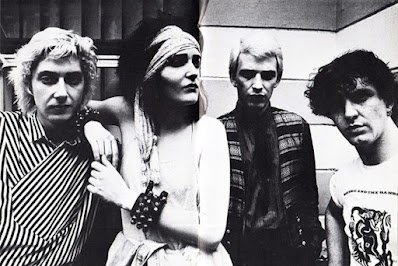JuJu was one of the first albums I ever bought, from a long departed department store in Glasgow called Lewis's. Not that I knew it at the time but it was an album that shaped the future of post punk and laid the groundwork for the emerging goth scene. For me this is the most complete and consistent Banshees album. Juju sees Siouxsie and the Banshees operating in a squalid wall of sound dominated by tribal drum and swirling guitars, all topped off with Siouxsie's unique fractured vocals. Siouxsie and company took things to an entirely new level of darkness on Juju, the upfront intensity of Juju probably isn't matched anywhere else in the catalogue of Siouxsie and the Banshees. Thanks to its killer singles, unrelenting force, and invigorating dynamics, Juju is a post-punk classic.
Original Banshees guitarist John McKay and drummer Kenny Morris had left following the release of the group’s second album, Join Hands, in 1979, but Sioux, and bassist Steve Severin found pedigree replacements in ex-Slits/Big In Japan drummer Budgie and former Magazine guitarist John McGeoch. The new-look Banshees rapidly developed almost supernatural chemistry. On their own, Juju’s hits showed that The Banshees were now leagues ahead of most of their contemporaries. The heady Arabian Nights featured an impassioned Sioux lyric commenting on the oppression of women in the Middle East while the mesmeric Spellbound was simply an unstoppable whirling dervish propelled by Budgie’s relentless drums and McGeoch’s frenzied acoustic guitar. However, the rest of Juju was equally satisfying and richly deserves its exalted reputation in the post-punk pantheon.


I hope Siouxsie's live return later this year sparks a renewal of interest in The Banshees' catalogue. In my opinion they barely put a foot wrong between 1978 and 1986.
ReplyDeleteHope so too, so much great music they made in that period.
ReplyDeleteHii thanks for posting this
ReplyDelete